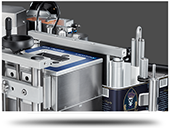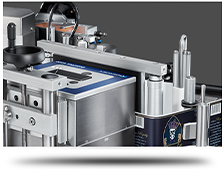
The coronavirus has consumers, retailers, and manufacturers in a panic. Here’s what to do.
It feels like yesterday, but it was back in December that Chinese authorities detected a new outbreak of coronavirus disease in Wuhan, Hubei Province, China. It’s hard to believe that four months have already passed since we first heard of the virus, but during that time, the whole world has been forced to take precautions to prevent the spread. From event and school cancellations to empty store shelves and emergency planning, everyone’s feeling the impact.
We’re all taking precautions to stay healthy. We’re stocking our homes, offices, stores, and warehouses with the supplies needed to disinfect surfaces and keep hands clean, per recommendations from the Centers for Disease Control and Prevention (CDC).
Recommended precautions by the CDC and the pandemic ruling by the World Health Organization paired with media publicity and social media hype has led to panic buying. Now being added to this conglomeration is the national emergency declared by the White House.
What exactly is panic buying? It’s the fear-based buying of unusually large amounts of a product in anticipation of a disaster, perceived disaster, a significant price increase, or shortage. In this case — coronavirus.
Everyone is experiencing the results of this pandemic, some differently than others. Depending on your line of work, this may be affecting you both professionally and personally.
Top 10 Items Selling Out Because of the Coronavirus
As you've likely experienced first hand, the coronavirus has spiked the demand for hand soap, hand sanitizer, disinfectant wipes, and toilet paper overnight, but the items that people are panic buying and are selling out across the country might surprise you.

Those who attend or work in public environments are doing everything they can to eliminate contamination and prevent the spread of infection, and their buying behavior reflects it.
This product list may change as states declare a state of emergency and as events, educational institutions, and companies are temporarily closing or being canceled. As time passes, it may begin to look more like a winter storm prep list instead: milk, eggs, and bread.
While we can't predict what will happen, we do know that right now that everyone is after these items and that they're hard to find. We hope you’re stocked up and feel sufficiently prepared.
- Hand sanitizer and wipes
- Hand soap
- Toilet paper
- Paper towels
- Cleaning wipes
- Dish soap
- Trash bags
- Disinfectant spray and cleaner
- Laundry detergent
- Tissues
In light of coronavirus, supply shortages, and the quickly changing safety guidelines and health declarations, what should consumers, retailers, and manufacturers do? Here are three things we can all do: be patient as more products are manufactured and distributed, create a plan for when another disaster or shortage occurs, and educate yourself so that you have all bases covered.
For consumers, retailers, and manufacturers alike, it all boils down to the three p’s: patience, planning, and preparedness.
What Manufacturers Are Doing To Keep Up With Production
What are manufacturers doing to address this situation and keep up with demand? Let’s breakdown into the three p’s.
Patience
While everyone wants to be prepared with more than enough Clorox Disinfecting Wipes, Purell hand sanitizer, Softsoap hand soap, and toilet paper, the demand is greater than the supply. While retailers and manufacturers are working to make, package, and distribute more products to replenish the empty shelves, publicly displaying impatience, anger, or only makes the situation worse for you and those around you.
As it is, many people are sharing their worries online; there’s a whole subreddit devoted to coping with these feelings. But if you can take steps to mitigate stress and impatience, while still keeping your family and/or your employees safe, it will make the difficult time more bearable, and it will help keep you physically healthy and your immune system strong.
Planning
While many businesses create a business plan, many fail to create a continuity plan. Continuity planning is the process of creating systems of prevention and recovery to deal with potential threats to a company. In addition to prevention, the goal is to enable ongoing operations before and during execution of disaster recovery.
Continuity plan often includes internal and external procedures including, but not limited to:
- Communication plan that includes phone calls, emails, and social media channels
- List of critical processes that are needed to keep the company functioning
- Facility evacuation plan
- Workplace sanitation plan
- Emergency and critical vendor contact information
- Employee contact information
- Individuals within your company with the authority to invoke the continuity plan
Be sure to have a business continuity plan in place and review it yearly.
This idea can be applied to individuals as well. Creating a personal or family plan for emergency situations can provide stability, clarity, and peace of mind.
Preparedness
Both personally and professionally, this can be as simple as staying up-to-date with current news from trusted sources. In this instance, following the guidelines and regulations set by the CDC, WHO, national government, and local authorities is the best place to start.
As for your business, this can mean planning ahead for both long-term and short-term business growth. Thinking specifically of the items being sold out now, manufacturers of hand sanitizers, hand soaps, and toilet paper should think about practical and financially feasible ways to increase output like adding a mobile module to their product line or temporarily offering overtime. For others, this could mean improving their line with a better way to label products quickly.
Stay Informed with Trusted Coronavirus Resources
To stay in the loop, bookmark this website page for quick access to key coronavirus resources.
- CDC: Coronavirus Disease 2019 (COVID-19) Situation Summary
- CDC: Coronavirus Disease 2019 (COVID-19) Frequently Asked Questions and Answers
- WHO: Rolling Updates on Coronavirus Disease (COVID-19)
- OSHA: COVID-19 Overview, Control, and Prevention
- National Foundation for Infectious Diseases: Coronavirus Overview
- Harvard Medical School: Coronavirus Resource Center
- Medical News Today: What to Know About Coronaviruses
- American Red Cross: Coronavirus Safety and Readiness Tips
.webp?width=200&height=135&name=2x-Packleader-logo-large%20(1).webp)













.webp?width=360&name=2x-color-logo%20(1).webp)